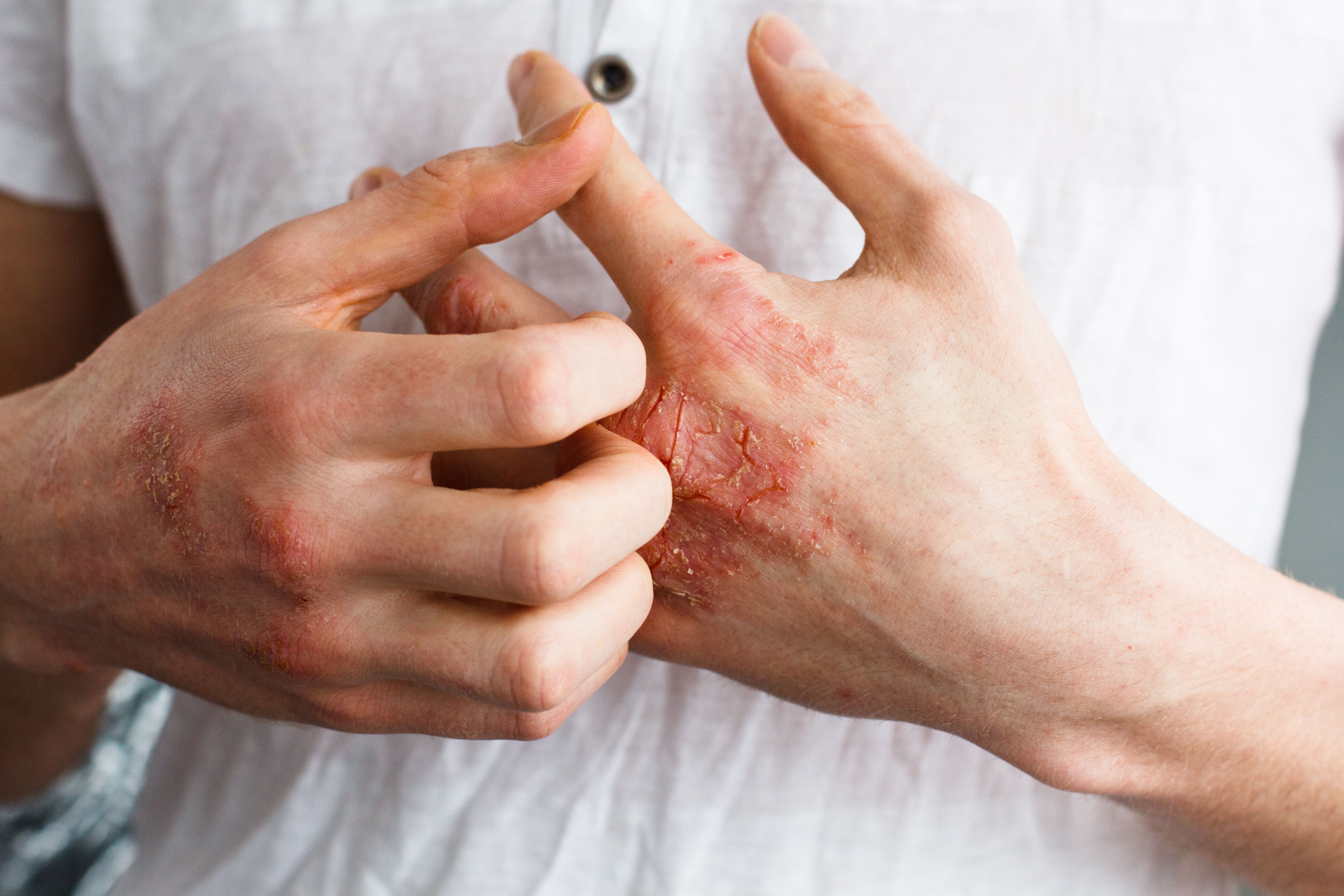Psoriasis brings unattractive red spots and patches and frustration for those suffering from its effects. Though psoriasis is a non-contagious skin condition thought to be caused by an autoimmune disease, the exact cause of the disease remains unknown, leaving sufferers struggling to treat their symptoms. If you’re looking for psoriasis solutions, you can find options with an online search.
From out-of-control cells growing on your skin and forming scaly patches, red welts, and lesions to white or silvery scales that itch and shed, psoriasis can bring chronic symptoms and discomfort. There are many treatment options, and you can find highly recommended tips for dealing with psoriasis if you search online right now.
 Ternavskaia Olga Alibec / Shutterstock
Ternavskaia Olga Alibec / Shutterstock1. Don’t Scratch or Pick
Psoriasis outbreaks can itch badly. That’s why people scratch and pick at the dry skin, flaky patches, and lesions. Instead of picking at your skin, try keeping your skin moist with lotions or skin moisturizers. You can also increase your skin’s moisture with a room humidifier. These are good ways to reduce itchiness, dryness, soreness, redness, and scaling. Picking and scratching only aggravates your symptoms, but there is a safe way to remove the dead skin of psoriasis patches.
Exfoliating acids weaken the bonds between cells of the skin, according to WebMD1. You can use salicylic, glycolic or lactic acid to soften the proteins, or keratin, of psoriasis outbreaks. These chemicals can be found in many lotions, ointments, gels, shampoos and skin creams. Soaking in the tub can also soften patches and make it easier to remove them gently with a pair of tweezers.
2. Heal with Sunlight
Sunlight can help heal your skin when you have psoriasis, so you should try to get some sun two or three times a week. The ultraviolet light in natural sunlight slows the growth of skin cells — including abnormal growth — and can even heal lesions. Both UVA and UVB rays can help to heal outbreaks, but UVB rays work better at slowing skin growth and shedding. Sunlight also helps to trigger the production of vitamin D, an essential nutrient.
It’s important to guard against sunburn. Most psoriasis sufferers are light-skinned people who are especially vulnerable to burns and skin cancer. You should apply sunscreen before exposing your skin. The safest practice is to limit your exposure to 10 minutes. You can increase your time in the sun by 30 to 60 seconds each day. You should consult your physician before before adding UV therapy to your daily routine, however. There could be other factors to consider based on your medical history.
3. Avoid Alcohol and Smoking
A growing body of evidence suggests that smoking and drinking alcohol increase the risk of developing psoriasis. A 1999 study conducted by Luigi Naldi, M.D.2, found that one out of every five cases of psoriasis was linked to cigarette smoking. Pinpointing the exact cause is difficult because there are thousands of noxious chemicals in cigarette smoke. Smoking definitely triggers flare-ups, and heavy alcohol drinking also causes increased outbreaks.
Heavy alcohol use can be dangerous because the alcohol can interact with psoriasis drugs. One study, reports, ScienceDaily3, found that women who drink non-light beer or two or three drinks per week experienced new outbreaks. Alcohol is believed to weaken the immune system, and heavy drinking can cause people to make unwise decisions that exacerbate psoriasis outbreaks.
4. Search for Cutting-Edge Treatments
Medical researchers are making cutting-edge advances in psoriasis treatments all the time, so you should stay on top of new therapeutic options. WebMD4 reports some of the newest treatment options include applying topical solutions, taking oral and injectable medications, and using steroids.
New biologic medicines have also been approved by the FDA to treat psoriasis, and it’s important to know about these potential new options. Biologics work by decreasing T-cell counts and blocking a substance called TNF-alpha, or tumor necrosis factor-alpha. New biologics can also bind to proteins that cause inflammation, which prevents or reduces irritation. Some of these cutting-edge biologics include:
- Cosentyx, a human antibody that blocks interleukins
- Humira, an antibody that blocks TNF-alpha
- Enbrel, a TNF-blocking antibody
- Elrezi, which is similar to Enbrel
- Taltz, which blocks inflammation-causing proteins
- Siliq, an antibody against interleukins
- Cyltezo, a drug similar to Humira
These biologics have been successful at lowering psoriasis outbreaks in many patients, the National Psoriasis Foundation5 reports.
You can relieve your symptoms of psoriasis by avoiding activities that trigger flares. It’s important to monitor your health and skin condition to determine the behaviors that increase or decrease outbreaks. Ultimately, in order to help manage and prevent psoriasis outbreaks, it’s crucial that those afflicted understand the newest and most successful options available. This means you should stay up-to-date about the latest treatment and management news, do your research regarding the most recommended methods, and search for solutions with your doctor.


